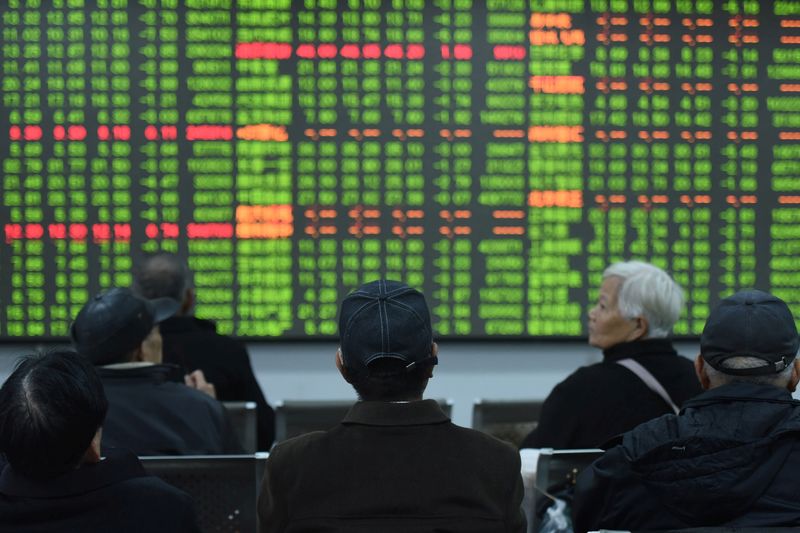By Tom Westbrook and Samuel Shen
(Reuters) - China's tech stocks slumped to new lows on Friday and Hong Kong's benchmark index hit an almost 10-month trough, as an unrelenting series of Chinese regulatory crackdowns crushed investors' confidence.
More than $560 billion in market value has been wiped off Hong Kong and mainland China exchanges in a week as funds capitulate out of once-favoured stocks, unsure which sectors regulators will target next.
The Hang Seng fell 1.8% and its weekly drop of 5.8% was the largest since the height of the pandemic panic in financial markets in March 2020.
Stocks in Shanghai also fell, while investors sold risky corporate debt and the Chinese currency. The yuan was poised for its biggest weekly loss in two months as investors rushed to safety amid global coronavirus concerns. [CNY/][.SS]
U.S.-listed shares of China-based tech-related companies gained ground as bargain hunters took advantage of recent sell-offs resulting from Beijing's ongoing regulatory crackdown, which has wiped half a trillion dollars from Chinese markets this week.
Alibaba (NYSE:BABA) Holding Group, Tencent Music Entertainment Group (NYSE:TME), Didi Global and iQiyi Inc advanced between 1% and 4.5%.
"There isn't really one trigger, but many bits and pieces that add to the narrative to stay away from China," said Dave Wang, a portfolio manager at Nuvest Capital in Singapore.
"Almost on a daily basis you have negative news coming out, so it forms the impression there's no end in sight."
This week alone China announced tougher rules on competition in the tech sector, summoned executives at property developer Evergrande to warn them to reduce the firm's massive debt and state media reported looming regulations for liquor makers, a favourite tipple for foreign fund managers.
On the heels of crackdowns spanning from steelmaking to e-commerce and education, the moves are sapping faith in a market that seems yet to find a floor after months of selling.
The Shanghai Composite dropped 1.1% to its lowest close in more than two weeks on Friday and blue chips fell 1.9%, with liquor makers leading losses.
China Telecom (NYSE:CHA) was a rare bright spot and surged on its debut in Shanghai.
Graphic: Sell the dip?, https://fingfx.thomsonreuters.com/gfx/mkt/klpykkdbzpg/Pasted%20image%201629441872893.png
The epicentre of the selloff has been the tech sector, which had been popular with foreign investors who are now afraid they can't quantify the regulatory risk and are selling in droves.
Hong Kong's Hang Seng Tech index, comprised of many one-time darlings, dropped 2.5% on Friday to a new record low and has shed about 48% since February.
E-commerce titan Alibaba's Hong Kong shares fell 2.6% to a record closing low and have halved from an October peak. Internet giant Tencent touched a 14-month low and food deliverer Meituan hit a one-year low.
"There's a herd mentality at the moment," said Louis Tse managing director of Hong Kong brokerage Wealthy Securities. "People see one person selling and then they do the same."
As a result, Alibaba now commands its lowest price-to-earnings ratio since its listing in New York in 2014 and Tencent its lowest in more than eight years.
"Tencent and Alibaba wouldn't be trading around 20 times earnings if the general mood around them was optimism," said Tariq Dennison, managing director at GFM Asset Management in Hong Kong, who was actually a buyer of both on Friday.
Adding to regulatory worries are concerns that China's economic recovery is losing momentum and debt risks are rising, as data points to slowing demand and factory output and suggests authorities are cracking down at a delicate time.
Policymakers' persistence with curbing red-hot property prices, for example, has markets on edge and corporate credit fell further on Friday with the news that heavily-indebted Evergrande had been rebuked by regulators.

The yuan has fallen through its 200-day moving average against a broadly rising U.S. dollar and weakened past the psychological 6.5 per dollar mark, hitting a three-week low of 6.5059 during onshore trade on Friday.
The Hong Kong dollar sits close to its weakest in a year and a half, also suggesting money is moving out of the city.